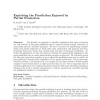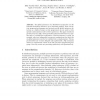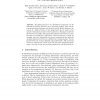1137 search results - page 30 / 228 » Partial Program Admission |
138
click to vote
IFIPPACT
1994
15 years 3 months ago
1994
: We describe an approach to parallel compilation that seeks to harness the vast amount of ne-grain parallelism that is exposed through partial evaluation of numerically-intensive ...
134
Voted
PPDP
2005
Springer
15 years 8 months ago
2005
Springer
The paper develops a self-tuning resource aware partial evaluation technique for Prolog programs, which derives its own control strategies tuned for the underlying computer archit...
118
Voted
EUROPAR
2006
Springer
15 years 6 months ago
2006
Springer
Abstract. The global quiescence of a distributed computation (or distributed termination detection) is an important problem. Some concurrent programming languages and systems provi...
100
Voted
CONCURRENCY
2008
15 years 2 months ago
2008
Abstract. The global quiescence of a distributed computation (or distributed termination detection) is an important problem. Some concurrent programming languages and systems provi...
147
click to vote
WFLP
2009
Springer
15 years 9 months ago
2009
Springer
A logic program strongly terminates if it terminates for any selection rule. Clearly, considering a particular selection rule—like Prolog’s leftmost selection rule—allows one...



